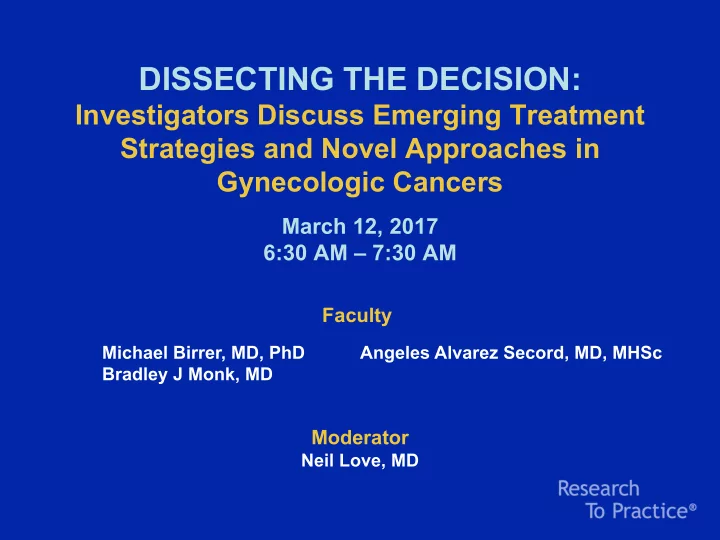

DISSECTING THE DECISION: Investigators Discuss Emerging Treatment Strategies and Novel Approaches in Gynecologic Cancers March 12, 2017 6:30 AM – 7:30 AM Faculty Michael Birrer, MD, PhD Angeles Alvarez Secord, MD, MHSc Bradley J Monk, MD Moderator Neil Love, MD
Module 1
In the past year, to how many patients did you administer neoadjuvant systemic therapy? Adjuvant chemotherapy after debulking surgery (of these, how many received IP treatment)? # OF PTS ADJUVANT CHEMO # OF PTS NEOADJUVANT (IP ADJVUANT) 14 26 (1) 15 23 (2) 35-40 10 (0) 20 30 (2) 25 60 (0) 5 10 (4) 5 10 (1)
A 50-year-old woman (PS = 0) with Stage IIIA epithelial ovarian cancer (EOC) is s/p primary debulking surgery with no gross residual disease (<1 cm). In general, would you recommend intraperitoneal (IP)/intravenous chemotherapy? No Yes No No No Yes No
A 65-year-old woman with Stage IIIA EOC undergoes optimal debulking surgery then receives 6 cycles of carboplatin/paclitaxel. One year later, elevated CA-125 leads to a CT scan, which reveals pelvic and retroperitoneal nodes that are biopsy-confirmed recurrence. The patient is BRCA germline mutation-negative. What treatment would you recommend? Carboplatin/PLD Carboplatin/paclitaxel q3wk + bevacizumab Carboplatin/PLD Multiple chemotherapies +/- bevacizumab Carboplatin/paclitaxel q3wk + bevacizumab Carboplatin/PLD Carboplatin/paclitaxel q3wk + bevacizumab PLD = pegylated liposomal doxorubicin
A 65-year-old woman has Stage IIIC EOC s/p optimal debulking surgery. She receives 6 cycles of carboplatin/paclitaxel, but 4 months after completion of adjuvant therapy there is disease progression. The patient is BRCA germline mutation-negative. What treatment would you recommend? Weekly paclitaxel/bevacizumab Weekly paclitaxel/bevacizumab Weekly paclitaxel/bevacizumab Weekly paclitaxel/bevacizumab Weekly paclitaxel/bevacizumab Weekly paclitaxel/bevacizumab Weekly paclitaxel/bevacizumab
Module 2
A 38-year-old woman diagnosed with Stage IIB squamous cell carcinoma of the cervix receives cisplatin, radiation therapy and brachytherapy. Two years later she presents with enlarged para-aortic and pelvic nodes and pulmonary nodules biopsy proven to be metastases. Which treatment would you most likely recommend? Cisplatin/paclitaxel/bevacizumab Cisplatin/paclitaxel/bevacizumab Carboplatin/paclitaxel/bevacizumab Cisplatin/paclitaxel/bevacizumab Carboplatin/paclitaxel/bevacizumab Cisplatin/paclitaxel/bevacizumab Carboplatin/paclitaxel/bevacizumab
A 76-year-old woman diagnosed with Stage IIB squamous cell carcinoma of the cervix receives cisplatin, radiation therapy and brachytherapy. Two years later she presents with enlarged para-aortic and pelvic nodes and pulmonary nodules biopsy proven to be metastases. Which treatment would you most likely recommend? Cisplatin/paclitaxel/bevacizumab Cisplatin/paclitaxel/bevacizumab Carboplatin/paclitaxel/bevacizumab Platinum/paclitaxel/bevacizumab Cisplatin/paclitaxel/bevacizumab Cisplatin/paclitaxel/bevacizumab Carboplatin/paclitaxel/bevacizumab
A patient is s/p surgery followed by whole pelvic EBRT for Stage II Grade 2 endometrioid adenocarcinoma. Two years later, she develops abdominal pain, and imaging reveals metastatic adenopathy in multiple pelvic and periaortic lymph nodes. What would be your most likely treatment approach? Do you use bevacizumab in the management of metastatic endometrial cancer? LIKELY TX BEVACIZUMAB? Carboplatin/paclitaxel Yes, frequently Carboplatin/paclitaxel Yes, occasionally Carboplatin/paclitaxel No Carboplatin/paclitaxel Yes, occasionally Carboplatin/paclitaxel Yes, occasionally Carboplatin/paclitaxel Yes, occasionally Carboplatin/paclitaxel Yes, occasionally
Do you use in a nonprotocol setting an anti-PD-1/PD-L1 antibody for a patient with metastatic endometrial cancer that is MSI-high? MSI-normal? MSI-HIGH MSI-NORMAL Yes, second line No Yes, second line No No No No No Yes, second line No Yes, second line No Yes No
Module 3
Cost and reimbursement issues aside, for a patient with metastatic ovarian cancer who has exhausted all approved treatment options and still has PS = 0, would you treat with an anti-PD-1/PD-L1 antibody? To approximately how many patients with ovarian cancer have you administered a checkpoint inhibitor on or off protocol? ANTI-PD-1/PD-L1 ANTIBODY? # OF PATIENTS Yes, for select patients 5 Yes, for select patients 0 No >20 No 15 Yes, for select patients 12 No 15 No 0
Recommend
More recommend